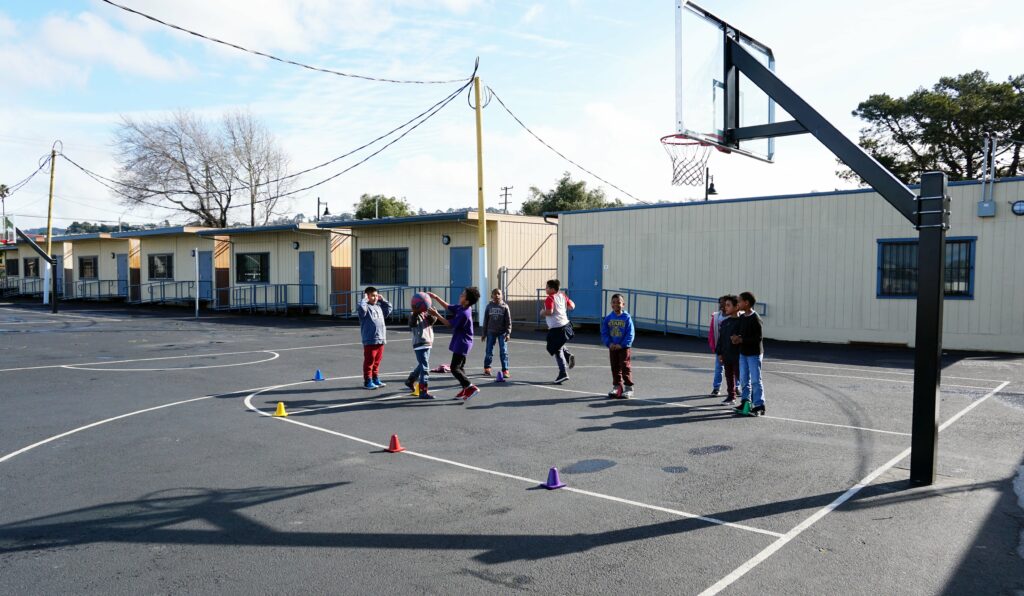West Contra Costa Unified’s Stege Elementary School in Richmond.
Credit: Andrew Reed / EdSource
After a yearslong fight to remodel an East Bay school that was deteriorating and infested with mold and asbestos, the West Contra Costa Unified School District found enough funds not just to remodel, but fully rebuild the school.
It’s a long-awaited victory for Stege Elementary School students, staff and community members. The district made promises to redesign the Richmond school at the start of the 2020-21 school year, but that never happened.
Now, a complete rebuild is set to start soon, with the new school set to open by fall 2027, according to district staff. Alten Construction will be rebuilding it.
“It’s about time, and the children deserve it,” said Guadalupe Enllana, the board member representing the Stege area.
The board unanimously approved increasing the budget for Stege Elementary School’s redesign from $43 million to $61 million during the last board meeting of 2024. The board had previously approved $43 million for the modernization of the school, but it wasn’t enough to cover a complete rebuild.
After backlash from the community and demands for a rebuild instead of remodeling, the district found $18 million in spare funds to cover a complete rebuild of the school.
The district is using funds left over from other building modernization projects that have been completed, said Melissa Payne, interim associate superintendent of facilities. It’s a strategy the district has used since 2016.
“I stand here with a commitment on behalf of our entire team —that we are listening, that we want to work together, and that we will,” Payne said during the board meeting.
While thanking the board for increasing the budget for the project, community members expressed frustrations about how long it took the district to get there.
“This is about equality,” a community member said during the public comment period. “If the students at Stege were not Black and brown, the school would have never deteriorated. This isn’t an issue of funds, this is an issue of will.”
According to district officials, Stege Elementary, built in 1943, has the highest population of Black and African American students in the district. Nearly 39% of students were Black or African American in the 2022-23 school year, and 34% were Hispanic or Latino.
The school has also struggled with low performance for the last decade. In the 2017-18 school year, it was one of the lowest performing schools in the state. More recently, 3.4% of students in grades 3-8 met or exceeded English standards in 2024, about 5 percentage points lower than the previous year. Last year, 18% of students in grades 3-8 met or exceeded math standards, up nearly 8 percentage points from 2023.
As groups, African American and Latino students statewide have had the lowest percentage of students meeting or exceeding math and English standards for the last decade. Last year nearly 37% of Latino students and about 30% of African American students met English standards. About 24% of Latino students and nearly 18% of African American students met math standards.
The school is also at the center of a lawsuit that was filed in July civil rights law firm Public Advocates, alleges the school district failed to remedy issues in the required timeframe for nearly 50 complaints filed by teachers, students and parents since June 2023. The bulk of the complaints were about poor building conditions at Stege Elementary.
The complaints said Stege had moldy walls, inoperable windows, classrooms reaching more than 90 degrees without ventilation, and broken floor tiles. Lead and asbestos were also found after the district hired an environmental firm to test building materials.
Building conditions at Stege Elementary were never improved, even as district officials “repeatedly” acknowledged conditions at the school were “dangerous,” the lawsuit says. The closure of the school was announced on July 23, four days after the lawsuit was filed and hazardous materials were detected during the removal of window panels.
Students and staff began the 2024-25 school year at Dejon Middle School.
“I think this has been long awaited, and I really hope that the process moving forward will be transparent and all inclusive to the greater community,” Enllana said. “I think it’s really going to take community buy-in not just from students and parents, but the greater community.”

